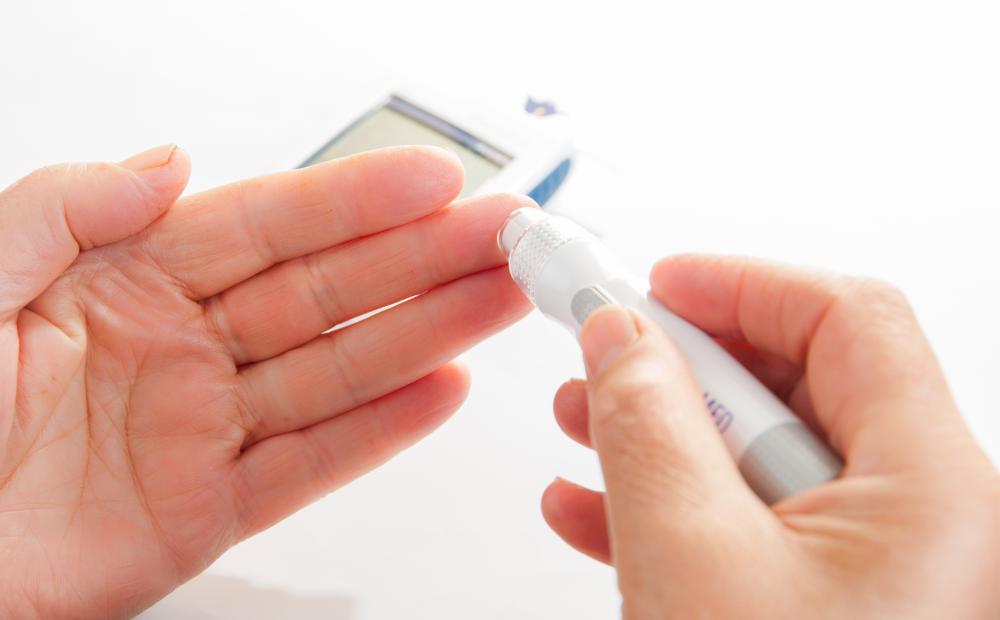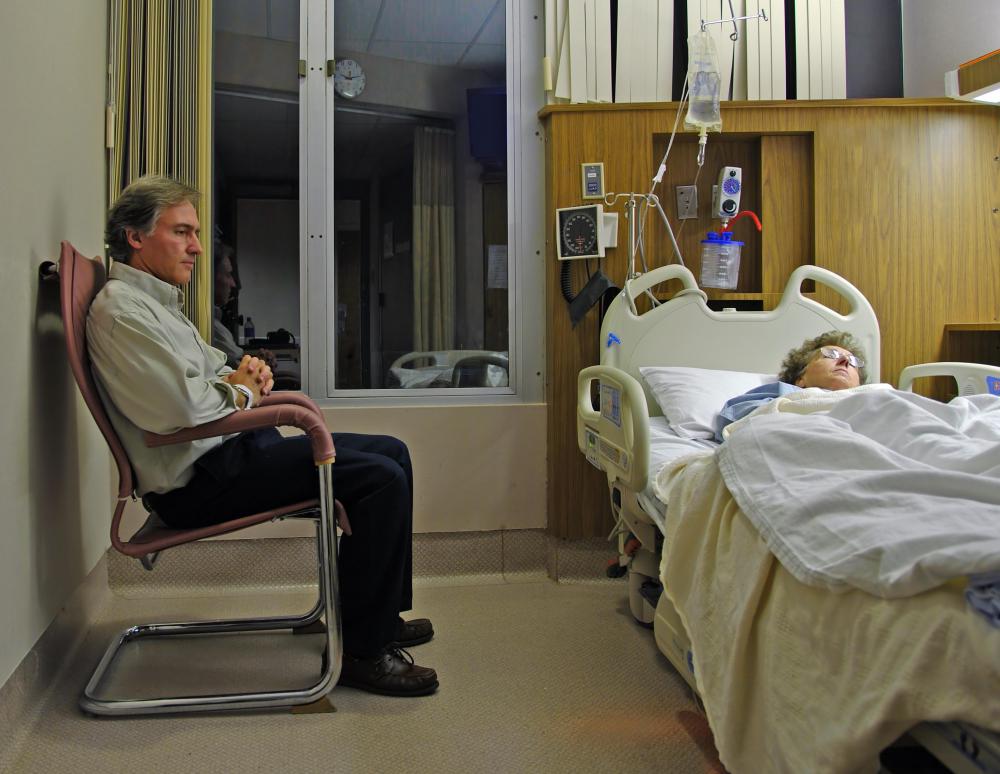At WiseGEEK, we're committed to delivering accurate, trustworthy information. Our expert-authored content is rigorously fact-checked and sourced from credible authorities. Discover how we uphold the highest standards in providing you with reliable knowledge.
What is Fasting Glucose?
Fasting glucose is a blood sugar measurement taken after no food has been eaten for at least 8 to 10 hours. A fasting blood sugar (FBS) test is usually the first kind used when a doctor orders testing for diabetes diagnosis. Diabetics can test their own fasting glucose before breakfast with a home blood sugar monitor.
Most diabetics record their blood sugar readings at different times each day to track their glucose levels overall during a given week. In addition to a fasting glucose, two hours after meals is another common time to check blood sugar levels. Many diabetic people eat five or six small meals throughout the day rather than three large ones to avoid causing big fluctuations in their blood sugars. Exercise can also affect blood sugar — usually causing it to lower. Fasting blood sugars should also be on the low side since there is no food in the body.

During diabetes diagnostic procedures, doctors first usually order an FBS test before having an oral glucose tolerance test (OGTT) conducted. While the FBS tests the body's fasting glucose on an empty stomach, the OGTT measures its reaction after drinking a controlled amount of sugary substance. The OGTT is usually performed several times in order to get an accurate result. A one-hour OGTT is routinely given to pregnant women to screen them for gestational diabetes. Gestational diabetes occurs in pregnancy and typically presents as high blood sugar levels.

A state of high blood sugar is called hyperglycemia, while a low glucose level is hypoglycemia. Diabetics may experience a wide range of sugar levels from high to low and this can be extremely dangerous. Drastically low or high glucose levels can cause medical problems or even coma and death. Understanding how the body reacts to taking in sugar as well as its fasting glucose level can help control wide fluctuations in blood sugars for better health outcomes.

FBS and OGTT differ from random blood sugar (RBS) tests. Unlike fasting glucose and sugar tolerance tests, the RBS checks blood sugars at any time. In non-diabetic people, blood sugar doesn't usually fluctuate as greatly as it does in many diabetics. Normal blood sugar levels are often considered to be about 100 ml or a little higher than that. The goal of monitoring fasting glucose as well as other sugar tests is to better control hyperglycemia, hypoglycemia and diabetes through awareness, diet and/or medication.
AS FEATURED ON:
AS FEATURED ON:















Discussion Comments
Fasting glucose is a quite simple test to prepare for, although it does sound quite daunting. All you have to do is fast from midnight until after your scheduled appointment the next day, given that it is not before eight o’clock, or after ten o’clock.
If it is before eight o’clock, you should make sure you have not ate for at least eight hours before your appointment. So, for instance, if your appointment is at seven o’clock in the morning, do not eat after eleven o’clock. If your appointment is at noon, do not eat past four in the morning, although you really should try not to eat after midnight anytime, unless you work third shift or are up the hours of third shift.
You really shouldn’t eat right before you go to bed anyway or any time, as this can increase your chances of gaining weight and having an upset stomach too.
You can prevent or at least lessen your chances of getting type two diabetes by eating healthy most of the time. Staying away from sugar and foods with sugar in them would be a good thing to do too.
@geekish - Yes, there are some symptoms of a vitamin D deficiency, although some people do not have any symptoms at all.
The most common symptoms of a vitamin D deficiency are muscle weakness and bone pain and bone fractures. The other symptoms associated with vitamin D deficiency are unexplained depression, persistent fatigue, weakness, mood swings and not being able to concentrate.
Feeling shaky and weak if you only go a couple hours without eating could be a lot of different things, but it is definitely serious enough to get to a professional to find out what is going on as soon as possible. Even if you don't have diabetes, it could be something just as severe or more severe. Go to the doctor as soon as possible!
@wander - There are several ways you can test your glucose at home, but all of them require some kind of tools and some know how.
The traditional method of doing this is by pricking your finger with a lancet and getting a reading that way.
A lancet is a small sharp needle and you use that to put a drop of blood on a test strip and then put into a meter to get your reading.
There are newer methods that allow you to prick other areas of your body instead of your finger, such as your thumb or upper thigh. With some of the newest ways, you don't even have to prick your finger but they use lasers and electric currents.
I really don't know how these newer methods work, and how you begin using them, I just know there are other options available.
My mother has had diabetes for many years, and it gets really hard to keep pricking your finger over and over again, but she is able to get accurate readings this way.
Once you get the hang of it, it is not hard, and you don't have to run to the doctors office every time you need check your levels.
If you want it to be a fasting check, just make sure you haven't eaten for at least 8 hours before you check it. Otherwise you can check it during the day to make sure you are staying where you need to be.
I feel as though I may need a fasting glucose test. Lately I have been getting very weak and shaking uncontrollably if I go too long without a snack or something. When I mean too long, I mean around two hours, nothing drastic like five hours or all day or anything.
The reason why I am extra alarmed is because I dated someone with type one diabetes before and he would get weak and shaky if didn't eat a snack within a couple hours. He also, a couple times, got so bad that he totally lost control of his mind and body, and collapsed on the floor. I definitely do not want this to happen to anyone, me included.
I guess I should go to the doctor and get an all-inclusive physical, although I got one earlier this year. The previous physical showed I have a very low Vitamin D count. I take Vitamin D supplements now. Does anyone know if a lack of Vitamin D has any symptoms? If so, what are they?
Is it possible to do a fasting glucose reading at home with your own blood sugar monitor? Or can this test only be performed at a doctor's office?
I live quite far from my doctor's office and would like to do a fasting blood glucose test without having to go all the way to her office. I am prediabetes and want to see if the dietary changes I've been making have helped get my blood sugar levels under control.
I am worried that despite everything I have done I will still have elevated fasting glucose levels and be stuck on the same diet forever. I really want my life to get back to normal.
@popcorn - My mother has Type 2 diabetes and it can be a really difficult medical problem to deal with. If you are taking a fasting glucose test you should know that the normal fasting glucose range is under 100 mg/dL, and those with fasting levels between 100 mg/dL to 125 mg/dL are considered to be prediabetes.
If you find yourself worried about food, just stop eating sugary things. You need to eat healthy and not starve yourself. If you do have prediabetes it can often be controlled with changes to diet. I would talk to your doctor after your test and figure out exactly what is going on with your body.
My doctor has asked me to undergo a fasting blood glucose test later this week and I am feeling a bit nervous. What is a normal fasting blood glucose level?
Lately I have been urinating a lot and feeling really irritable after eating, so my doctor thinks I may have diabetes so he is making sure I get all the tests I need. I have actually been scared off eating and haven't been having much since he told me I could have such a terrible disease. I am wondering what I should eat until the fast before the test? Do you think that just going vegetarian would help me feel better?
Post your comments